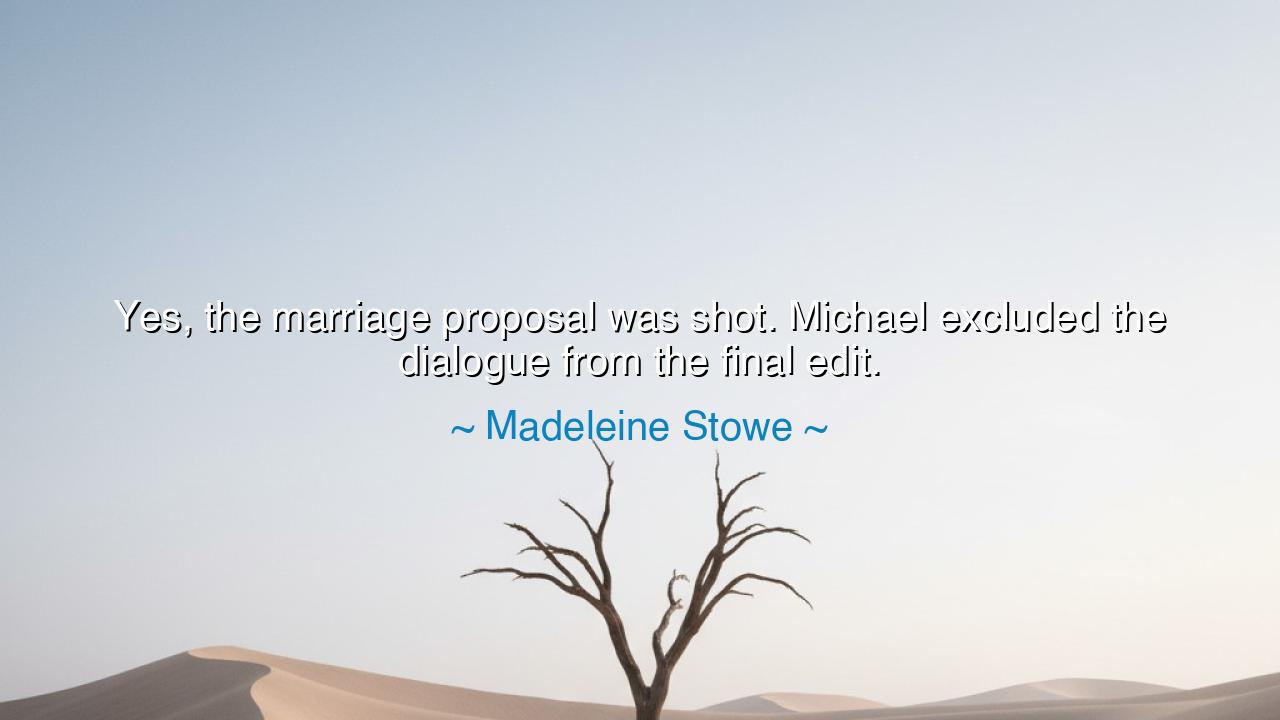
Yes, the marriage proposal was shot. Michael excluded the
Yes, the marriage proposal was shot. Michael excluded the dialogue from the final edit.






When Madeleine Stowe reflected, “Yes, the marriage proposal was shot. Michael excluded the dialogue from the final edit,” she spoke not only of a moment in cinema, but of the eternal tension between vision and expectation, between what is longed for and what is shown. To speak of a marriage proposal that was filmed but later erased is to reveal how even in art, the moments we anticipate most fervently may be withheld, forcing us to reflect on the essence of the story itself. Her words teach us that absence, too, has power, and that silence can sometimes thunder louder than speech.
The meaning of this quote lies deeper than the surface of filmmaking. Stowe recalls a moment of intimacy—one that audiences often wait for, that culmination of romance in the symbolic act of proposal—yet the director, Michael Mann, chose to remove it. Why? Because sometimes the truest art lies not in spelling out desire, but in leaving space for imagination. The exclusion of dialogue reminds us that love, union, and devotion need not always be defined by words. The most sacred bonds can be felt in silence, in gesture, in gaze. Thus, what was cut away becomes itself a teaching: that life does not always give us the closure we crave, but often offers something subtler, more profound.
The origin of Stowe’s remark is tied to the making of the film The Last of the Mohicans (1992), in which she starred. The movie brims with themes of love, sacrifice, and endurance in the face of chaos. A proposal scene would have offered neat resolution, but Mann’s choice to exclude it reveals his dedication to realism and atmosphere. Love in times of war and ruin does not always pause for formalities. In this way, the cut itself mirrors life: moments of importance are sometimes unspoken, sometimes unfinished, yet they remain no less real.
History offers us many parallels. Consider the tale of Antony and Cleopatra. Their love was fierce, filled with grandeur, yet it was never crowned with the formalities of union. There was no proposal, no ceremony to seal their passion. And yet, their names echo through the ages, for their bond was written not in vows, but in destiny. So too, Mann’s erasure of the dialogue reminds us that love is measured not by the words spoken, but by the devotion shown in action, in sacrifice, and in silent strength.
The wisdom of Stowe’s words is that what is excluded can sometimes be as meaningful as what is revealed. A proposal scene might have given audiences satisfaction, but its absence challenges us to seek deeper meaning. Do we need to hear the words to know the truth of the bond? Or can we learn to perceive love beyond convention, in the unspoken rhythms of connection? This is not cynicism, but a call to wisdom: to look for truth beneath the surface, and to accept that sometimes life, like film, withholds what we think we need, in order to show us what truly matters.
The lesson is this: do not cling too tightly to expectation. In love, in life, in art, proposals may be cut, words may be left unsaid, and endings may remain unresolved. Yet the truth of devotion can still endure, even in silence. What matters is not always what is spoken, but what is lived. Do not despair when the story does not unfold with neat perfection; instead, learn to find beauty in what remains, and strength in what is unspoken.
What then must the listener do? In your own relationships, do not measure love by ritual alone. Treasure the actions, the sacrifices, the quiet moments of understanding. In your own life, when a chapter feels incomplete, trust that its meaning may still be full, even without the closure you desired. And in your pursuit of art, truth, or love, remember that sometimes absence speaks more powerfully than presence.
Remember always: the proposal was shot, but the dialogue was excluded. Let this serve as a parable. Words may vanish, gestures may be unseen, but truth endures in silence, if only the heart is wise enough to perceive it. Thus, cherish not only what is given, but also what is withheld, for both are teachers on the path of wisdom.






AAdministratorAdministrator
Welcome, honored guests. Please leave a comment, we will respond soon